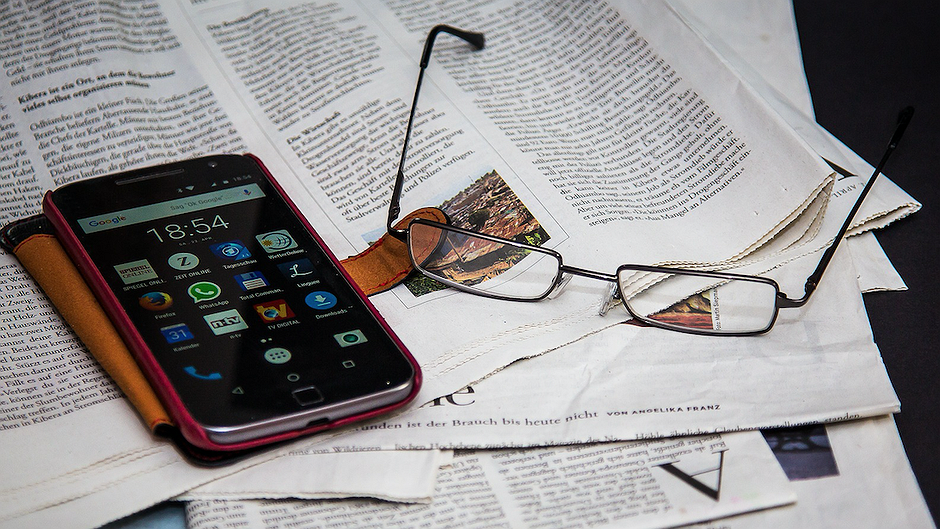
Why Fact Checking is Becoming Everyone's Job
Have you ever rushed to share a picture or a video on social media just because it was trending? With a click of a button you can become part of the trending story and with that same button you may also be sharing fake or inaccurate news without even realizing it. To learn more about why journalists and citizens alike need to be active fact checkers, we talked with Mahmoud Ghazayel a journalist at www.24.ae, a blogger and passionate fact checker who has been raising awareness about the importance of fact checking for several years now.
1. To what extent do journalists need fact checking tools nowadays?
One of the many skills that any good journalist needs to have is the ability to research and obtain accurate information. Simply speaking you can't exclude fact checking from a journalist's skills set and with all the technological advancements there is a huge opportunity for both journalists and individuals to improve the concept of fact checking and take it to new levels.
2. Do fact checking tools differ depending on the type of story a journalist is working on?
If you're covering a live event such as a political debate, then you need real time fact checking tools, that means you need a team of fact checkers and a lot of preparation in advance. Your focus is usually to simply state whether the information is true or false.
However, let's say you're working on a report on the number of war casualties in Iraq, the fact that you have more time allows you to access more information and to obtain accurate findings. Your fact checking process is different in this case because you can go into more details and can explain where your findings came from.
3. Does the fact checking process always result in true/false results or is there a grey area that can be left for questioning?
I would say that personal biases play a very important role in the results of a fact checking process and journalists need to be aware of how these biases affect their work. There are instances when the answer is a definitive yes or no and there are other times when the there is some truth to a picture or story such as the picture of Jackie Kennedy taking a selfie. The picture is a real picture of her however the hand has been photoshopped.
4. How do you raise awareness about the importance of fact checking and combat the spreading of fake news?
Unfortunately there are a lot of people online who share false information for the sake of being the first to break the news without even considering the consequences of what they are doing. A lot of media outlets are sometimes guilty as well.
One way to raise awareness is to first correct the information by sharing evidence that shows why it is false, this is something that needs to be done on a personal level instead of waiting for someone to correct the news.
Another way is to not ignore fake news, we all need to be active fact checkers regardless of how unimportant the story/picture may seem and the first and most basic thing anyone can do is to always question the authenticity of what they are sharing.One simple and free way to do this is through the google reverse imaging tool.
Engaging your audience in the fact checking process is also something that journalists can do. For example I had pictures of a war zone in Iraq but could not identify the exact location because I am not familiar with that geographical area, by reaching out to local residents I was able to identify and access reliable sources for information.
5. How do media outlets take corrective actions when sharing inaccurate news stories?
In the Arab world specifically there aren't clear laws with regards to online publishing and this leaves room for a lot of error. There are a lot of times when the media outlet may correct a fake headline or the content of a story but keep the same false link in order to maintain the ratings of that story. Sometimes they may delete the story and leave the reader asking where it disappeared. The best case scenario is when the audience requests the information be corrected and the media outlet responds proactively.
Check out some Fact Checking tools you can start using today that were featured on our blog last week.
Want to boost your journalism skills? Why not sign up for our free online courses taught by The Rory Peck Trust.
Related courses

90 mins
 School of Data
School of Data
90 mins
 School of Data
School of Data Rory Peck Trust
Rory Peck Trust
50 mins
 Rory Peck Trust
Rory Peck Trust
Blogs

6 useful resources for journalists covering Covid-19
With a global pandemic spreading throughout the world, journalists are under increasing pressure to report accurate and relevant news for the masses. Often when covering a crisis, those on the reporting frontlines compromise their physical safety and mental health. To show some solidarity, the Advocacy Assembly team curated a list of useful resources from other organisations leading the way on this.

5 ways to find data for your next story
Data journalism is fast becoming a big trend in newsrooms across the globe. However, data isn’t always so easy to find. Here are five ways to get data for your next article.



